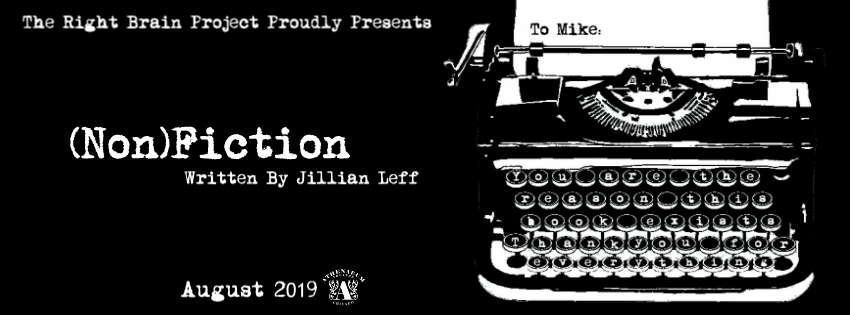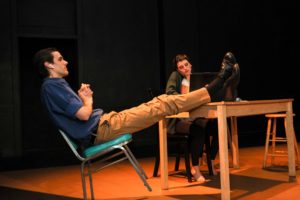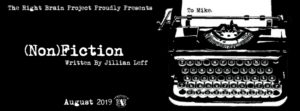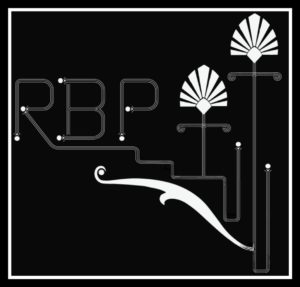
Slow-moving and tedious, “(Non)Fiction” tells the story of Stephanie, an aspiring novelist (Madeline Bernhardt) and her twin loves: her boyfriend Mike (Justin Verstraete) and her love of writing. She works hard at balancing her personal life and her need to express herself on paper with the hope of launching her career as a published author. Mike works as an accountant and is extremely supportive of her efforts in both an emotional and material sense, so that she can stay at home and write full-time.
It takes a full 50 minutes (out of a 90-minute show) before the audience comes to realize that the novel that Stephanie is writing is a thinly-veiled account of her boyfriend’s painful childhood in a religious cult. When Mike finds out, he is outraged. To his mind, this is a chapter of his life that he had wanted to bury. He just wants his life to be normal and unencumbered. How dare his girlfriend exploit his sensational story! How could she be so cold and calculating?
Initially, Stephanie hides her manuscript from Mike, because she wants to complete it before showing any part of it to him. She works with her agent Dan (Tim Lee), to perfect it, with his promise of bringing her literary creation to the masses. Her novel is supposed to be a pleasant surprise for Mike, since he was her inspiration for it in more ways than one. So she wraps up the final approved draft literally in a bow—and now he finally reads it.
Mike is not only upset and offended that his private life is being exposed publicly but is profoundly horrified that all sorts of anecdotes in Stephanie’s fictionalized story can clearly identify him and his sister Emma (Cristiana Barbatelli) as cult escapees. With the truth soon to be out in the open, he is suddenly in fear for his life. Stephanie, for her part, is deeply troubled, as she has no desire to hurt Mike. If anything, she wants to honor him with the fact that his story is finally being told. And now, it’s practically too late for her to make any changes to the manuscript (although she would clearly have had the last word to quash its publication).
The main problem with the play, however, is that the audience is denied a glimpse into the manuscript itself. Stephanie’s novel per se never becomes an integral part of the script. It is the proverbial elephant in the room. We are told that it is very good—the publisher loves it—but that’s all we know.
As for the gory details of Mike’s painful memories, we can only infer the worst. We never learn how or why Emma and Mike left the cult. What was the cult leader Jeremy like? What sort of abuse did the siblings go through? What did they witness? How did they escape? Did somebody sneak them out? Where did they hide? Did a deprogrammer help rescue them? Did other cult members try to stop them or leave with them? What dangers did they experience? There is some implication that their parents arranged for them to leave, but nothing more is shared. In short, we don’t know anything about Mike’s and Emma’s lives and that of their parents in that environment. It would have been good to know some of this information, if only at the very end of the play, to tie up loose ends. Unfortunately, the audience doesn’t see, feel, or taste the exploitation, the manipulation, or the molestation—or whatever it was that happened back then.
Had we been given at least one major reference point regarding Mike’s intolerable past, then the audience would have been all more shocked and outraged when Stephanie would have dared to reveal his story without his explicit knowledge. As the script stands now, his abuse is discussed in generalities, much too abstract to be real to us but also much too horrible for him to acknowledge.
Stephanie’s struggle between her relationship and her career is a theme that is not new to literature or drama. Sadly, her inner conflicts concerning her life and her work makes her come off as being a self-serving user, despite her many protestations that the opposite is the case. She suffers from a lack of personal boundaries—not realizing that her boyfriend’s life is his own and not an appendage of hers—and that he has a right to his privacy and to the story of his life. Mike’s refrain “What’s more important: the book or me?” is an important one. Although Stephanie is obviously a bright person, it’s unclear whether she has fully comprehended the personal toll that her narrative might take on her boyfriend. Never once does she say to him, “I disguised your character very well in my text; what are you talking about?” Never once does she say that she is truly sorry for what she did. It is in her defense of her writing that she exposes herself to be unethical.
Food is frequently used to provide cover for parts of a bad script. We saw Twizzlers and Twinkles, Pop-Tarts and whip cream, and actors talking with their mouths full. Ho-hum. Or should I say Ho Ho?
The most significant prop is a Rubrick’s Cube, which Mike plays with from time to time. It is interesting to notice that when he decides to go into hiding with Emma and “come clean” by disclosing the full truth about Jeremy and the cult, that is the very moment when the Rubrick’s Cube has all the correct colors on each side.
In the last analysis, I saw “(Non)Fiction” as having had the promise of being a deeper story. There are so many unexplored implications when one’s life has literally become an open book. The premise is excellent. The actors are good. This could have been a very juicy tale, a lot of which could have been explained through dialogue between Mike and his sister or via staged readings of the novel. The best part might be its very apt title. But the pacing is off; the dialogue is fair; some scenes are choppy; Stephanie is especially unsympathetic; and the audience is a bit too far removed from the action to care about what will happen next. On top of it all, it’s unclear if the playwright (Jillian Leff) intended Stephanie to be as thoughtless and insensitive as she appears to be. To fix these issues in the script (as with Stephanie’s novel), a significant rewrite is needed.
However, the production is not without merit. It gives the audience the opportunity to ask several questions about the value of expediency in today’s workaday world. What would you be willing to do to advance yourself in your chosen profession? To what extent would you be willing to sacrifice your personal relationships in order to gain an income, if not also fame and fortune?
“(Non)Fiction” is a production of the Right Brain Project and is playing through September 14th at the Athenaeum Theatre, 2963 N Southport Avenue, Chicago.
Show times are:
Friday 7:30 p.m.
Saturday 7:30 p.m
Sunday 3:00 p.m.
Tickets are $25 for general admission and $15 on Sundays. Industry discounts always apply.
Advance tickets can be purchased at: https://web.ovationtix.com/trs/pr/1011938
For more information about “(Non)Fiction” or the Right Brain Project, please visit www.TheRBP.org
To see what others are saying, visit www.theatreinchicago.com, go to Review Round-Up and click at ” (Non) Fiction”.








More Stories
“The Firebugs” reviewed by Julia W. Rath
“The Book of Grace” Al Bresloff with another from Paul LIsnek
“The Last Five Years” MILWAUKEE